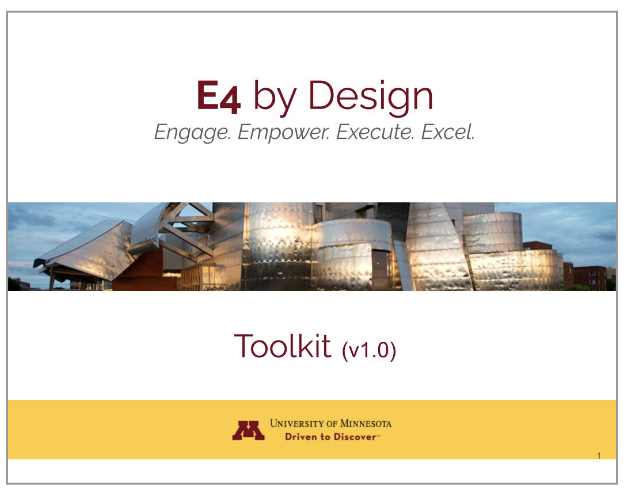E4 by Design

Engage. Empower. Execute. Excel.
E4 by Design is a program rooted in the University’s MPact 2025 strategic plan and particularly aligned with the system-wide commitment to promote fiscal stewardship, improve administrative services, and boost continuous improvement practices. E4 is RIO’s approach to engage and empower employees to tackle challenges within their work environment, execute improvement initiatives, and excel in the delivery of services to the research community. The program reflects RIO’s values of Excellence, Integrity, Responsiveness, and Impact. By embedding a work philosophy centered on service excellence in the fabric of RIO, we aim to further develop our operational efficiency, demonstrate undeniable service quality and effectiveness, and boost RIO’s reputation as a skilled learning organization.
How E4 Is Implemented
In practice, E4 is:
- A management commitment specifically designed to improve the delivery and quality of services
- A set of common principles and concepts that we apply consistently to our work so that we become as effective as possible
- Coaching and tools that empower everyone to collaboratively tackle challenges and make improvements wherever they are in the organization
- An action plan for developing and growing the E4 program, identifying a list of priorities in RIO where the program principles should be utilized
The E4 Principles
At the root of the E4 work philosophy is a set of seven equally important principles which are applied consistently and deliberately by service teams. They are the center of gravity for improving the delivery and quality of services.

Principle #1 - Optimize for Effectiveness
Seek to deliver the desired result or the right output, simply, consistently, and as efficiently as possible.

Principle #2 - Be Evidence-Driven
Steer clear of guesswork or assumptions. Gather information, data, and get feedback from customers and employees. Analyze to identify the root cause of challenges and issues.

Principle #3 - Engage
Performance and quality of services depend on people working together to produce the right results. Help colleagues connect work to the larger picture, reach across team boundaries, and use the best thinking anywhere in the organization. Create an environment where teammates are included, involved, and can do their best work.

Principle #4 - Streamline Processes
State what does not work well, creates friction or service delays. Initiate ways to eliminate what is not valuable or necessary. Adopt a "fix what bugs you" mentality. Make it easier for customers and teammates.

Principle #5 - Set Targets and Measure
Understand quality requirements and establish metrics that cover the gamut of service quality dimensions. Quantify and qualify both accomplishments and progress.

Principle #6 - Fail Forward
Try something new or different, take some measured risks, and expect some setbacks along the way. Learn from them. They are necessary on the way to deliver even better services.

Principle #7 - Build Trust
Gain the trust of others with actions, follow-through, collaboration, and transparency.
E4 Toolkit
The E4 Toolkit is a suite of simple and directly applicable concepts that are free of confusion and can be picked up by anyone looking for a way to bring positive change in their work environment. This resource combines tools and concepts borrowed from existing quality and service improvement methodologies.

Explore the E4 by Design Toolkit
The toolkit evolves over time as input and suggestions are received. Questions, comments, and feedback can be sent to E4byDesign@umn.edu.
Priorities
Key initiatives, driven by the Research and Innovation Office, reflect the E4 by Design commitment.
| Initiative | Description | E4 Principles |
|---|---|---|
| Faculty Burden Reduction Committee (FBRC) | Launch and support a new committee charged to advise the Vice President for Research and Innovation on ways to improve RIO’s operational effectiveness and save time and effort for researchers at the University of Minnesota. |
• Optimize for Effectiveness |
| MN-GEMS Project | Upgrade the UofM proposal and grant management system to improve proposal submission processes, award setup time and award management. For more information, visit the MN-GEMS project webpage. |
• Optimize for Effectiveness |
| Research Animal Resources (RAR) Technology | Invest in the University’s pre-clinical research capabilities and improve the UofM’s animal research facility management through the implementation of a modern animal operations information system. Make RAR processes more visible to researchers and enhance the efficiency of workflows relating to animal ordering, colony management, animal health records, and billing/invoicing. | • Optimize for Effectiveness • Be Evidence-Driven • Engage • Streamline Processes • Set Targets and Measure • Build Trust |
| Toward a New Normal (TANN) - RIO’s Work with Flexibility Implementation |
Develop resilient, post-pandemic work arrangement models and create an organization that offers effective flexibility, promotes connectedness and makes efficient, sustainability-focused use of space. |
• Optimize for Effectiveness |
Get Started
For managers and staff who are exploring ways to improve the delivery and quality of services they offer, here is how you can get started:
- Familiarize yourself with E4 by Design Principles.
- Explore the E4 by Design Toolkit.
- Share your interest in the E4 by Design program with your team; incorporate it into your work and planning discussions.
- Schedule a presenter-lead E4 by Design conversation at your next team meeting or retreat. See the E4 by Design Team Session Plan & Description for details.
- Share your stories: are some of the E4 principles, concepts, and tools already in use in your team? Please share your experience and projects with us at E4byDesign@umn.edu. We want to showcase your work and progress.
E4 in Action

IACUC adjusted their annual continuing review of protocols to dramatically reduce time spent by PIs and research teams. Learn more about how E4 is reflected in this IACUC policy and process change.

ORIS moved its service management system from University servers to a System-as-a-Service solution. By completing this E4-driven improvement, ORIS is saving the UMN money and time.